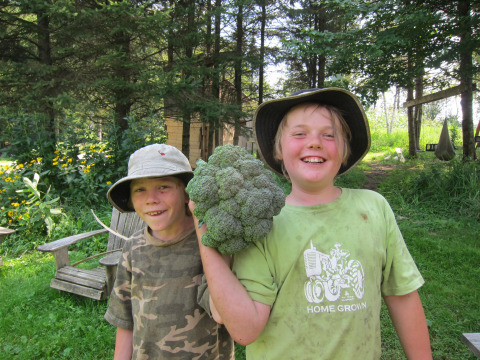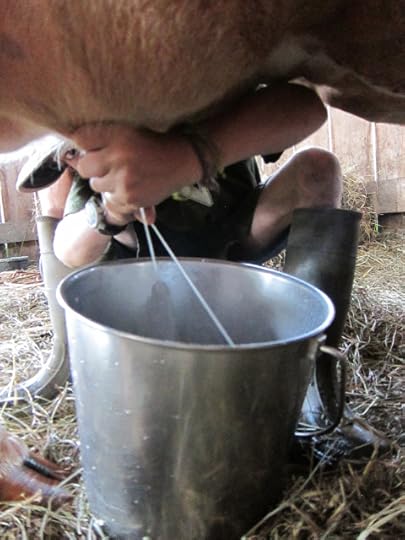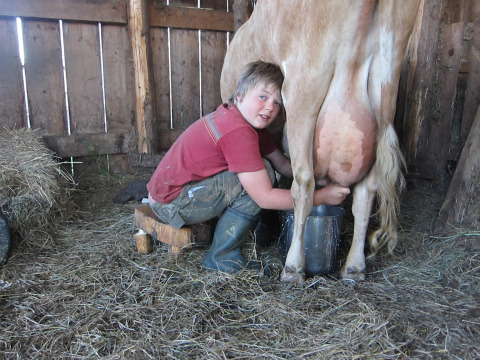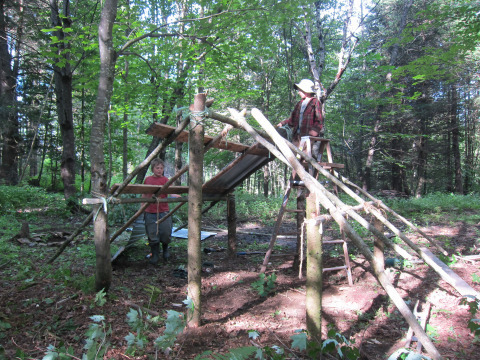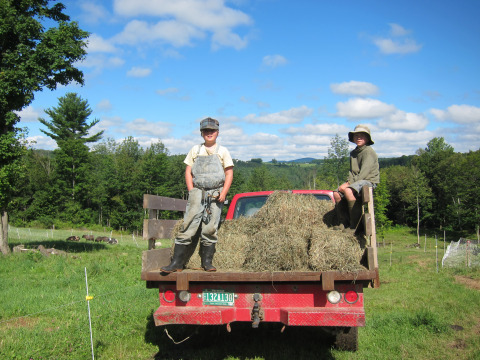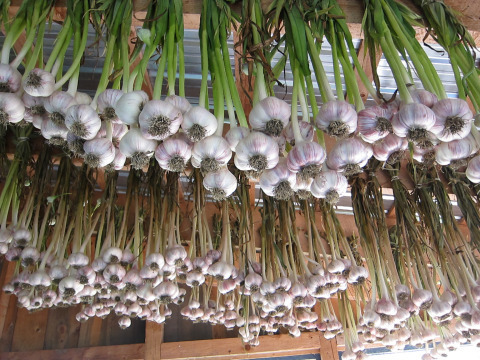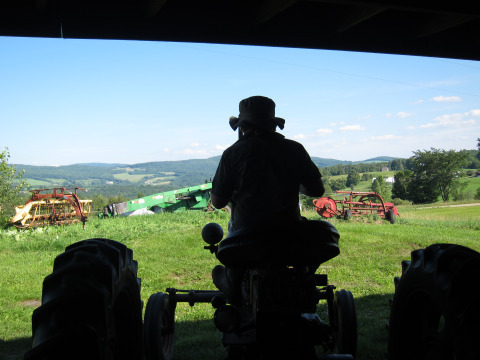Ben Hewitt's Blog, page 63
August 21, 2013
Moving Cows
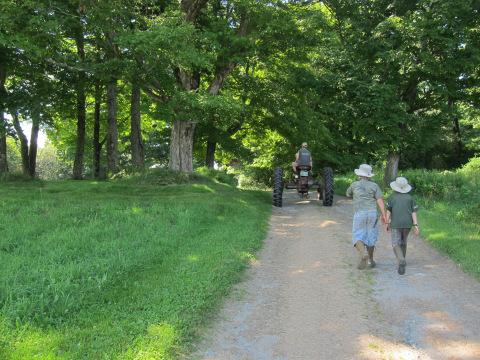
The boys are so devoted to me, they follow me everywhere
Every morning, soon as it is light enough to see, I move the cows to a fresh paddock. We give the cows a new piece of pasture every 24 hours; this is known as rotational grazing, and it is essential to the good health of both the land and the animals feeding upon it. Owing to the marvel of electric fencing technology, it is not hard work, although given that our pasture is rather steep in places, it is not uncommon for me to break a sweat tromping up and down the hill with a fence reel in my hands. For those of you who have never greeted the rising sun with sweat beaded on your forehead, I highly recommend it.
I often think of chores as being something of practice for me, perhaps not unlike meditation or prayer is for some. And moving the cows is for me the core of this practice, at least during the six months I have the luxury of doing so (the other six months, I have the luxury of chipping ice from the animals’ water bowls, throwing bales of hay over their respective fences, and sweeping snow from the solar panels. Not bad, but they ain’t quite the same). Of all the daily chores I perform on this ground, moving the cows is the most graceful, the most like a dance. The cows gather at the corner of fence they know from experience will soon drop, shifting from hoof to hoof in anticipation, their watchful eyes following my progress. Cows are not terribly ambitious creatures – this is much of what I love about them – but the prospect of fresh grass stirs something in them. I suspect it’s not unlike the thing that stirs in me when Penny drops a batch of sourdough donuts into a pot of hot lard.
I like moving cows because I like cows, and therefore I like doing what I know is best for the cows. And I like moving cows because I like moving, and therefore I like walking back and forth across our pasture, the dew wet tips of grass grazing my shins, my feet sloshing in my boots. I need new boots something fierce; my current pair is full of holes, they’re like ships taking on water, destined for the river bottom. But of course they’ve been this way for two summers now and I’m doing just fine, which makes me wonder: Maybe I don’t need new boots, after all.
I like moving cows because it forces me to pay attention: Good grazing practices demand a particular focus, because the pasture is always changing, in accordance with the season, the weather, the length of day, and unseen forces that I am unlikely to ever fully understand. In June, the grass grows so furiously we cannot keep up with it; it is an ocean of grass, a tsunami of forage, and it is almost impossible to imagine that it will ever end. We think this will be the year we graze into November! But by August it is already waning, and we ration the pasture carefully, hoping for warm September rains to push along the season’s final growth. We think maybe we can keep the cows on grass until the middle of October! To move cows is to in some small way be held in the palm of nature. I can’t say why, but any time I have this opportunity, I am comforted.
I like moving cows because I like the way cows smell and I can smell them while I’m moving them. If you don’t like the way cows smell – and I’m not talking about their shit or piss (these are good smells, too, but are perhaps acquired tastes), but rather the simple, warm, contented bovine essence of them – you either got nose problems or there’s something more drastically wrong with you. The smell of cow in the morning is like the first flames of a fire on a cold winter’s day, and I sometimes think that even if I didn’t covet butter and cream and milk and meat, I’d keep a cow around just so I could smell the thing.
I like moving cows because there has yet to be anything wrong in my life that can’t at least temporarily be fixed by moving cows. This means that either my life is so good that nothing has yet gone wrong enough that moving cows can’t make me feel better, or that moving cows is so powerful that it can overcome even those things which are terribly wrong.
Which is it? Honestly, I’m not sure it matters.

August 20, 2013
Carrying the Stone
There comes a time every summer when the weight of everything that must be done is a stone on my chest. Finish second cut. Finish firewood. Finish the woodshed. Slaughter the chickens. Slaughter the steer. Slaughter the pigs. Make bacon, make sausage. Mill lumber to finish the woodshed. Pick blueberries. Pick blackberries. Harvest chanterelles. Finish the solar dehydrator. Finish the outdoor pizza oven (Well, ok, so we’ll have to start it, first). Backfill the 1000-foot trench for the electric service. Clip pasture. Start pulling next year’s firewood. Nah, screw it, don’t. It’s good winter work, anyway. Build a new chicken coop. Nah, screw it. The old one’ll do for another year.
You can see how these things can pile up on a body, each it’s own contribution to the weight of that stone, until you can almost forget why you ever picked up the darn thing in the first place. You hear about your friends’ summer vacation, two weeks paddling remote waterways and living off fresh-caught fish and wild berries in Minnesota or some other place you’ve never been but wouldn’t mind going, and you think damn. You drive past your favorite local bookseller on your way from the farm store with the bits and pieces you need to jury-rig the tractor back into action and they’ve got a sign in the window that reads Snack, Nap, Read, and you have to laugh. In summer? Are you joking?
I used to have a shirt from one of the most interesting and talented bicycle frame-builders in the business. It read “It’s simple, but it’s not easy.” I always liked that shirt; to me, it’s apt expression of everything I truly value in the fragile bubble of my small world. I feel as if our lives are simple; our needs – at least when compared to the contemporary norm – are simple. Our days are largely defined by commonplace routine and ritual that are intractably connected to the very means of our survival on this very piece of land. Maybe simple isn’t quite the right word for this reality, but it’s close enough.
But easy? Not really, at least not as easy is commonly understood to embody comfort and convenience. Last night, in Lynn and Martha’s barn, where it felt as if all the day’s heat had gathered for happy hour, and the sweat ran down our faces like the tears of some great sorrow, we stacked one 50-pound bale after another, hundreds in total. It was the simplest task in the world: Throw the hay, stack the hay. But easy? Hell, no, and we knew that when we got home, there were hours of chores still to be done. Even as I tossed bales to Penny, balanced high atop the mounting stacks, I could feel those chores pressing on my chest.
I don’t mean to complain, nor to bemoan the simple fact of that stone. It is an inevitable and necessary part of the life I have chosen, and I am grateful for it in the same way I am grateful for a hard winter, because to know the weariness of carrying it is necessary part of knowing the joy in setting it down. You cannot have one without the other. True satisfaction, true gratification and gratitude do not ask you to give something of yourself: They demand it.
So for the next few weeks, until things settle into the relative calm of autumn proper, I will give. I will give by running from one task to another, by arising in the morning with my muscles sore from the previous days’ tasks. I will give be feeling always slightly overwhelmed and occasionally breathless. I will give by stacking hay, by splitting wood, by sawing and hammering and killing. I will give the sweat that falls off my body, and I will give by knowing the small pains of all the small wounds of labor-by-hand that accumulate on my physical being. I will give because I want my life to be exactly as Richard’s shirt proclaims: Simple, yes. Easy, no.
But here’s the funny thing: Even as I give, I will take. I will take all of this effort and I will store it in the reservoirs of my body, character, and spirit. Because if I have learned anything in my nearly 42 years on this grand and beautiful world, it is that these things cannot develop without being fed. If you starve them, if you deprive them of the opportunity to carry that weight and feel that heft and hardness, they will wither.
I don’t want to wither.

August 16, 2013
Weird As We Want to Be

Cutting up a steer hide in preparation for fleshing and drying
The past few mornings have been of the sort that has me looking at the woodstove in that old, familiar way: Not as an inanimate hunk of metal, but as friend and provider, a warm and breathing entity, something that can transform the inhospitable ways of a cold, as-yet-sunless dawn into the open arms of the day to come. I love those first fire-warmed mornings of late summer; I pull a chair to the open door of the cookstove firebox, my coffee set atop its iron surface, while the family slumbers above and the dog snorts and farts in her bed. I listen to the stove metal ticking as it expands, and every so often my feet get a little too close to the flames and the smell of roasting sock wafts through the air. That, my friends, is living, and though I’m loathe to make definitive, grandiose statements such as “I will never live without wood heat,” I will never live without wood heat.
Soon. The first fire will be soon. I am biding my time, now, shivering through the five-o’clock hour clad in a flannel shirt, hunched over my rapidly cooling cup of coffee, teasing out the anticipation of the first morning fire, because of course the anticipation is half the fun. This is the beauty of changeable seasons – the anticipation, the sense of finiteness and appreciation it engenders – and it is not one I would trade for much of anything.
Early this morning, after I’d had quite enough of “teasing out the anticipation,” I embarked upon chores. I’ve got the routine down pretty pat by now, with something like a decade-and-a-half of doing the same damn thing every morning and evening written into my bones and blood. Hell, I hardly even have to think about what I’m doing, which is probably to everyone’s benefit.
Every so often, when I’m going about my daily routine, so commonplace and even mundane to me, I am visited by a sense of how odd my life really is. Or maybe not how odd my life is, but how things have evolved in ways that make my life seem odd to many.
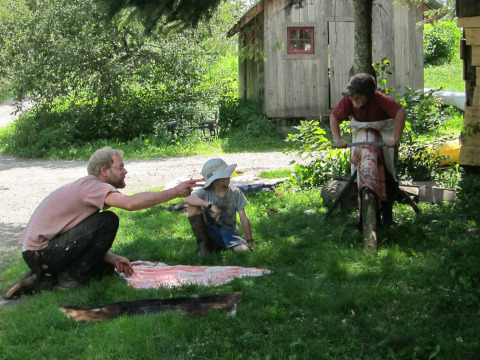
Fleshing. Very hard work. At least, it looked like very hard work. ‘Cause I didn’t actually do any of it
This morning, I had one of those moments. I had just returned from the hen house with a handful of eggs. It’s a journey that takes me past the garden in which the greenbeans are currently going bonkers. So I grabbed me a handful of them in my eggless hand and continued to the kitchen. There, I commenced to chop the chanterelles the boys collected yesterday and, in their usual fashion, had deposited on the counter in a haphazard fashion that seemed engineered to infuriate. I mean, really: Why couldn’t they put the darn things in a bowl, rather than splaying them across every bare surface within arm’s reach? And why, pray tell, was there a hunk of half-dry hide from the steer we slaughtered last week IN THE MIDDLE OF THE KITCHEN TABLE!?!
Once the chanterelles were dispatched, I put the knife to a tomato from the tomato house (suckers are coming on strong, now), and lit a flame under the pan in which I’d fry the sausages we made from the last batch of piggies. We made fennel, chorizo, maple, and some sort of spicy Italian thing; everyone seems to like the maple best.
Out of the fridge, I cut a slab off the 10-pound block of cheddar I’d picked up the day before, part of a blueberry barter with Jack and Anne, and damned if it weren’t a treat to have professionally made, “boughten” cheese for a change. We don’t get much of this stuff; it’s not really part of our financial landscape, and we haven’t yet figured out how to make a decent cheddar. Someday. In the egg pan, I tossed a spoonful of the butter I’d made the day before. It sputtered a bit, and then settled into a slow melt.

Stretching and tying onto racks for drying
Do you know that my children have never eaten boxed cereal? Actually, I don’t know if that’s true for certain, because they’ve slept over at friends and breakfasted at these houses, so perhaps they have ingested the odd Fruit Loop or Cheerio in their young lives. But in this house, never. Not once. I’d never thought about that before this morning, and I can’t say where the thought came from, but there was something about the absurd abundance of all the food at my fingertips – a reality that is so common to us that we almost can’t help but take it for granted – that made my mind settle on it.
I fear some may read this and think I am bragging, or that I am condescending toward those whose children do eat cereal, perhaps every day. Perhaps more than every day. Neither is my intent. I understand all too well the forces that compel families to gulp down bowls of processed grain and sugar products on their hurried ways out the door, into the tumultuous arms of this thing we call life. I understand that not everyone wants or is able to collect the eggs, wander for the chanterelles, raise the pigs, or pick the blueberries they will trade for the cheese.
The point I’m trying make, I suppose, is not really pointed at you: It’s pointed at myself. Yes, my life is odd, or at least it may seem odd to some. And yes, that sense of being out-of-step with contemporary norms can sometimes leave me feeling a little lonely, not so much in a personal sense, but in a cultural sense. In the sense of the awareness that we are, for lack of a better word, kind of weird.
The point I’m trying to make (again, to myself, although you are welcome to take from it what you please) is to never, ever stop being grateful for the freedom to be as weird as we want to be.

August 14, 2013
Turn up the People
A couple of days ago, I was talking about my occasional ambiguity regarding this site with a friend. “Well,” he said, “at least you’re building your brand.”
I was a little dumbstruck, because there it was: He’d freakin’ nailed it. The very source of my on-again, off-again misgivings: That I might, however unintentionally, be building my brand. To tell you the truth, I’m not even sure exactly what it means, but I am certain that I don’t like the sound of it. To me, it sounds like diminishment, like something calculated and hollow. In my experience, the people that do the truly important work of this world are not brands: They are people. I think of my neighbors, arising at 4:30 a.m. seven days per week, 52 weeks per year. By lunch, they have put in a full day of work and have yet another full day ahead of them (or, if it’s sugaring season, nearly two full days) before they will see their bed again. Milk, maple syrup, firewood, plowing driveways… on it goes.
You don’t know these people; barely anyone outside the borders of this little town knows these people. Yet their work is far more essential than mine will ever be, for what could be more essential than food and heat? Certainly not the written word. This is not false modesty speaking (as Penny would tell you, I possess no surfeit of this quality); it’s just the cold, hard truth. My neighbors have no “brand” beyond their reputation in the community as people who work hard and upon whom you can depend to keep your fires lit and your driveway passable. If I told you their name, you would not recognize it; if I told you the name of their farm, and you did a Google search, you would not find it.
I like my work; I am exceptionally grateful for it. And I am coming to realize that an essential part of my work – particularly in the Internet era – isn’t merely selling my writing; it’s selling me, or at least some version of me. I realize this, but I’m not entirely comfortable with it, and so I think a lot about how to do it as honestly and transparently as possible. Part of that is being open about my ambiguity pertaining to this space. Another part is reminding myself (and all of you) that much of the truly important work of the world is conducted in anonymity. It is done by men and women whose names we will never know; whose stories will never be told outside their small circle of family and friends.
We may never hear these stories. But that doesn’t mean they’re not all around us. That doesn’t mean they’re not important. And if we manage to keep our minds uncluttered of all the branded tales swirling around the toilet bowl of the 21st century American marketplace, perhaps our ears will become attuned to them.
So here’s my advice for the day, however unasked for it may be: Turn down the brands. And turn up the people.

August 12, 2013
Letting Them Be
The boys are building a shelter down in the woods, inspired by a recent trip to help raise a barn. The fellows raising the barn – two mid-20’s college buddies who soured on corporate life and went in on a 30-acre parcel half a stone’s throw from the Canadian border – are living for the summer in a netted tent they constructed of small trees and a few sheets of metal roofing. The tent is situated on a small jut of land by the banks of a stream, and it’s impossible not to imagine how it might be to fall asleep there, with the water rushing by and the breeze stealing through the net. I could see my sons’ imaginations kick into overdrive the moment they saw the structure; I could tell simply from how their faces were arranged that they’d decided to build one for themselves. This decision had been reached in approximately four-and-a-half seconds. Not a word had been spoken.
The very next morning before our rooster, Blood, had halted his crowing for the day, before the sun was yet full in the sky, before Penny and I had finished morning chores, the boys were down in the woods, scouting locations. They’d brought a shovel, a handsaw, and numerous sections of baling twine, with which they’d lash the framing posts together.
We called them for breakfast, and they arrived with dirt and bark clinging to their bare skin. They ate hurriedly, in a slurping fashion, and then retreated back to woods.
Three hours later, Rye slipped into the house, left hand tucked into right armpit. “What’s going on?” I asked, although I knew perfectly well by the way he carried himself and by how quiet he was: He’d hurt himself. “Cut myself,” he said softly, pawing through the first aid drawer with his uninjured fingers. He extracted a bandaid and the bottle of tree tea oil, and commenced to doctoring his wounded digit. I continued washing dishes and tried not to watch out of the corner of my eye.
Two hours after that, Fin tromped through the kitchen and bee lined for the first aid drawer. He’d smashed a thumb with his hammer, and blood was oozing out from beneath his thumbnail. He pawed through the first aid draw with his uninjured fingers, extracted a bandaid and the bottle of tea tree oil and commenced to doctoring his wounded digit. I continued preparing lunch and tried not to watch out of the corner of my eye.
By dinner, with no further bloodshed, the boys had erected a sturdy frame. At each juncture of wood, twine had been wrapped and tied. The roof was peaked, and a sturdy ridgepole supported rafters of small red maple and fir poles. They’d dug a pit off to one side and lined it with rocks to contain their cooking fires. During all of this, they’d asked for and received no help from Penny or myself, although clearly one of us would need to cut the metal roofing for them. But otherwise, this project was theirs. The mistakes were theirs. The arguments over how to space the roof strapping were theirs. The small triumph of seeing it assembled was theirs. Even the associated injuries and treatment of them were theirs.
I think I might finally be learning to let go. To let them saw and hammer. To let them negotiate and argue and yell. To let them screw up and start over and screw up again. To let them bleed and to stop their bleeding.
To let them be.

August 8, 2013
The Thing About Time
This time of year, after he’s taken the second cut of hay off the hilltop field that borders the long row of maples towering over our shared fence line, Melvin turns his milkers loose to graze whatever fringes the mower missed. At 4:30 every afternoon, the boys climb on their bikes and wheel into the field to drive the cows down for evening milking. It’s a quarter-mile or more to the barn, down the steep hill that not so long ago was home to a ski tow Melvin’s boys had rigged up by suspending the front end of an old car at the hill’s crest and running the rope around one of the drive wheels.
The boys love this task. Fin and Rye have reached the age at which they are eager to prove they are growing into the young men they will become, and there is perhaps no better proof of such a thing than successfully driving a herd of 30 milk cows across a high, green hayfield and down into the barnyard below. Perhaps, like me, they recognize that Melvin is approaching the end of his milking days and they can sense that some year in the not-too-distant future, it is likely there won’t be any cows to drive to his barn for evening milking. Still, I suspect that’s not much of a factor; they’re only 11 and 8, after all. They’re too young to be motivated by sentiment.
I, however, am not, and last night around six I traced the boys’ path to the barn, ostensibly to relay to Melvin the boys’ account of how one of his cows had spooked during that afternoon’s round up and pushed through a weak section of fence. But of course a phone call would have sufficed and the real reason for my walk (although I couldn’t admit it to myself at the time) was no more complicated than the simple fact that I know it won’t be many summers before I won’t have such a ready excuse to stroll across that field. I won’t have such a ready excuse to tromp down the meandering path cut into the hillside by the force of literally hundreds of thousands of hoof prints over all the years Melvin’s cows have shuffled their unhurried way up and down that slope. I won’t have such a ready excuse to stand in our neighbors barnyard, him on one side of a windowless window frame and me on the other, chatting about the weather and haying and pasture and all the meaningless minutia of our day. Meaningless to anyone but us, that is.
As I mentioned briefly a few posts back, living between two dairy farms has proven to be one of the greatest unanticipated and unplanned blessings of living on this hill. We did not buy this property with such a thing in mind; we would not even have known to look for such a thing. And yet now I can’t even imagine anything else, and I find it literally impossible to express the ways in which it has enriched our lives, perhaps because some of these ways defy logic or reason.
I don’t like to think of Melvin’s inevitable retirement, although of course I want what’s best for him. But when I see Fin and Rye coming back from herding the cows down to evening milking, riding or pushing their bikes along the hayfield’s ridge, nothing visible behind them but sky, as if one false step would send them plummeting off the edge of the world, I just want time to stop. When I stand in on one side of that windowless window frame with Melvin leaning against the other side, the late day sun washing us both and behind him, the soft outlines of his cows as they stand for milking, I want time to stop.
But that’s the thing about time: It keeps on going. Kids grow up, dairy farmers retire. Things change, both in ways that can be anticipated and those that can’t.
And damned if that isn’t one of the most beautiful truths ever.

August 6, 2013
Come September…
… I’ll be chilling at this event with a talk and, if you’re really lucky, my best Weird Al Yankovic impersonation. That should be worth the price of admission alone!

August 5, 2013
The Season of Everything

Penny stopped yelling at us to go faster just long enough to take this picture
On Saturday, all of about 90-minutes after answering my phone call (and probably about 89 minutes after cursing themselves for picking up the phone in the first place), our friends Michael and Paul arrived to help run conduit. Suddenly, a job that had seemed nothing short of overwhelming became whelming in the extreme. (Is “whelming” a word? I don’t know. But I like it).
Michael and Paul are excellent workers; both do physical labor every single day of their lives. They are strong and capable, but also know how to work, which is to say, they know to take breaks and drink water and tell jokes and sit for a few minutes in the grass every hour or so to let the muscles and mind recuperate. As we trudged down the trench with conduit in hand, I sang to them, a ridiculous ditty I composed on the spot (this being something of a specialty of mine), about a father who forces his young children to work in a trench while he sits beneath a tree, drinking beer. Perhaps I was merely projecting my deepest hopes for the future of my family, but in any case, they endured both the labor and my warbling and I dare say we almost had a good time. Liedloff, as it turns out, was right.
The next day, Penny and I and the boyz decamped for a barn building project up near the Canadian border where a bunch of ambitious young fellers are raising a barn using only hand tools. They had thoughtfully saved a load of 6×6 roof supports for me to saw, which I did, complaining only a little and singing not at all, for which they did not even know to be grateful, since none of them had ever before heard me sing. That evening, Ryan came over to help with the last of the conduit and by 8:47, I was deep into a dream in which my children were toiling in a trench and I was… ah, never mind. It’s not very flattering.
Today, Nate and I glued up about 75% of the conduit; tomorrow, we’ll finish the rest. The job is becoming more whelming by the hour.
During this flurry of work, in the moments I wasn’t generating noise pollution with my vocal cords, I thought a bunch about my intentions for this space. There was something about the tangible, hands-on nature of this weekends tasks that had me questioning the efforts I put into this site. Don’t get me wrong: I get plenty out of it, and it’s become something of a launching pad for future projects. For all that, I’m grateful.
But in some ways, it also feels disingenuous, and I wonder if it’s because I’m not entirely clear on my intent. Am I trying to sell books? If so, I’m not doing a very good job of it. Am I trying to have conversations, exchange ideas? Maybe that’s happening, at least to an extent. Am I just so damn generous as to want to share these little glimpses into my life and mind? No, I’m not that generous, and even if so, is it not somewhat narcissistic to assume that anyone would care? Do I just want whatever attention this space provides? I hope that’s not it. Do I think it’s someday going to make me money? No, I do not, although I recognize that publishing is changing, that few writers can afford to isolate themselves in a world that demands connectivity, however mediated it might be by technology and distance.
I’m not suggesting I’m about to give it up. All I’m saying is that I want to get clear on my intent or, if there is no intent, get clear about that. Maybe that’s ok. Not everything has to be part of some larger agenda. I can just do it for the sake of doing it. If nothing else, there’s little question that committing to this space has made me a much more disciplined writer. I guess that’s a good thing.
Whatever the case, it’ll probably be a little slower than usual ’round here. The blueberries are coming in fast and furious, there is still some conduit to be glued, 1000-feet of trench to be backfilled, one steer and 75 broilers to be slaughtered, firewood to be finished, a woodshed to be completed (you’d think we’d complete the woodshed before we finished the firewood, but nah. And really, what fun would that be, anyway?), and so on. It is the season of everything. And it’s the best.

August 2, 2013
File Under: Things I Barely Understand But That’s OK Because Penny Does
There were a number of requests after Wednesday’s post to talk a bit more about the soil remineralizing we’ve done over the past few years.
I will tell you what I know, but here’s the cold, hard truth: Like so much of the knowledge that makes this place tick, soil amending is resides in Penny’s bag of tricks. She’s always been the green thumb ’round these parts; about all I’m good for in the garden is popping potato larvae (and this year, as I noted, there’s hardly any of that, which is almost disappointing, given the satisfaction I glean from this particular task) and weeding. And eating. I’m real good at eating.
Anyhow. About four years ago, Penny got turned onto a fellow named Dan Kittredge, who is one of those wickedly smart folks that I find sort of intimidating. Smart people do that to me with some frequency; maybe it’s a bit of an inferiority complex on my part for never having completed my skooling, or maybe it’s just that I never really understand what the hell they’re talking about.
Penny, on the other had, does seem to understand what Dan’s talking about, especially after taking a couple years worth of classes and workshops and whatnot. And what he’s talking about, best as my addled brain can cipher, is that most of the soils ’round these parts (and, I’m guessing, ’round your parts) are severely lacking in essential minerals and enzymes. This is probably the result of having been farmed for decades without having had these things restored, or it might be from erosion, or whatever. But the basic precept is that unless you restore the mineral balance, you’ll never realize the genetic potential of your crops. They won’t produce as much, they won’t be as resistant to pests and disease, the crop won’t store as well, and it sure as heck won’t be as nutritive as it could be.
I gotta say, when I first heard about all this (which is to say, when Penny returned from her first workshop, giddy with excitement), I was downright skeptical. After all, we had great soils: Tremendous organic matter, and the soil tests we were getting at the time all came back looking right good. And yet, even I had to admit that our gardens (we have three rather huge gardens, plus all the assorted berry bushes, fruit trees, and whatnot) were inconsistent at best. Some things did ok, some did great, and plenty did neither. It never really made much sense to us why things weren’t producing the way it seemed they should be.
This is no longer the case. While we still have the occasional curiosity (this year, for instance, the tomatoes aren’t as robust as they were last year, although this might have something to do with the fact that it was really freakin’ cold in May, when they were potted on the unheated, glassed in porch), almost everything we grow these days is pretty much astounding in flavor, storage capacity, and all around vigor. It’s a marked difference from a handful of years ago; in many cases, we are having to plant much less of a particular crop, since the yields per row are so much higher. That might all sound like I’m bragging, and for that, I apologize. But that doesn’t make it untrue.
I’m now going to skip all the stuff I don’t understand or know, such as what, specifically, Penny’s amended with and why. But the truth is, it wouldn’t be much help to you, anyway. The key to all this is that you’ve got to start with a really good soil test and you’ve got to have some basis for understanding how to amend in relation to that test, and how these minerals work symbiotically. If Dan happens to be doing a workshop in your area, I’d highly recommend attending. He’s a fantastic presenter and despite my third paragraph comments, does a good job of making this stuff intellectually accessible. (I have been to one of his workshops, myself)
There are a few downsides to all of this: It demands at least a layperson’s knowledge of soil science. It is also not cheap; I bet we’ve spent a grand on minerals and other amendments over the past few years. Nor are many of these amendments readily available on a hyperlocal basis. These are absolutely not inconsequential issues. But the idea is that once you get the balance back, you’re set for a long, long time. Indeed, we added almost nothing to our gardens this year, with the exception of a bit of homebrew compost. It will be interesting to see how things progress over the next few years.

August 1, 2013
Free Primordial Pleasure! Act Now, Supplies Are Limited!
My favorite passage from the late Jean Liedloff’s book The Continuum Concept. The preface to this passage is that she is living with an indigenous tribe in South America and has just learned she must carry a heavy load of sugarcane over two mountains.
I shouldered the cane, and as Anchu waited for me to lead the way I started the first ascent. The burden of dread of the long walk back, accumulated on the way down, and hardened through lunch at Anchu’s and the time at the cane garden, was now compounded by the news that I was to have a heavy cane to carry as well. The first few steps were weighted with the thought of the strain I always experienced on treks through jungles, especially uphill and carrying anything that did not leave my hands free.
But quite suddenly all that added weight fell away. Anchu gave not the slightest sign that I ought to walk faster, that my prestige would suffer if I kept a comfortable pace, that I was being judged for my performance, or that time on the path was in any way less desirable than time after arrival.
Hurry had always been a factor in similar exercises with my white partners, as had anxiety about keeping up with the men, preserving the honor of the fair sex, and the uncontested assumption that the occasion was unpleasant because it tested one’s physical endurance and moral determination. This time, the very different demeanor of Anchu and the Sanema removed these elements and left me simply walking in the jungle with a sugar cane on my shoulder. Gone was any sense of competition, and the physical strain turned from an imposition upon my body to a satisfying proof of its strength, while my teeth-gritting will power in the face of martyrdom no long applied.
Then a new pleasure added itself to my freedom: I was aware of carrying not just a stick of cane but part of a load shared among three companions. I had heard about “team spirit” until it ceased to connote anything but pretense at school and summer camp. One’s own position had always been at risk. One always felt threatened, watched, judged. The straightforward business of doing a task in partnership with a fellow being was lost in a tangle of competitiveness; the primordial feeling of pleasure at pooling one’s forces with those of others had never had a chance to arise.
I’d keep going, but really, this is a just a long, round-about way of saying that if any of you would like to stop by and help me slide 1000-feet of conduit over 1000-feet of electrical wire whilst hunched over, dirty, and sweating in a deep, narrow trench… well, perhaps you too can experience that “primordial feeling of pleasure”!
Hell, I won’t even charge you for it.

Ben Hewitt's Blog
- Ben Hewitt's profile
- 37 followers


